9 Exotic Fruits That You Must Try At Least Once

Alpa Momaya
October 12, 2022

Alpa Momaya
October 12, 2022
When you visit your local markets, you see a plethora of fruits displayed – from bananas to apples, pineapples, guavas, watermelons, and many others. However, we often get tired of eating the same fruits unless we make them into colorful smoothies, shakes or add them in our desserts.
It’s time to try out some exotic fruits and refresh your taste buds. Well, you can’t expect to find these exotic fruits easily in your local markets as they are rare, delicate, and sometimes expensive.
From dragon fruit to durian, rambutan, discover nine best exotic fruits that are celebrated across the globe. If you happen to find a few of these fruits, you should attempt to try them at least once in your lifetime. So get ready, as we explore some of the most exotic fruits found globally.
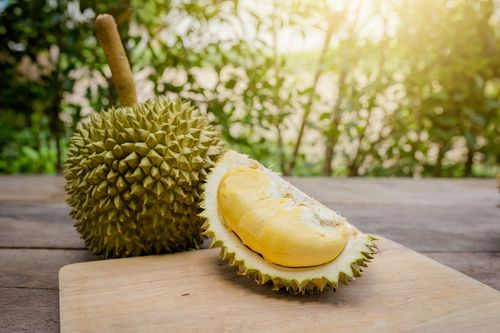
Durian, also known as the ‘king of fruits’ in many Asian countries, is a large, green, spiny fruit that comes from the Durian tree. While the fruit is notorious for its ugly, pungent smell, it is a very good source of nutrition and people consume it to regulate their high blood pressure and lower harmful cholesterol levels.
Durian is abundantly found in the Southeast part of Asia, including countries like the Philippines, Malaysia, Thailand, and Indonesia.
1 cup diced Durian fruit – (Approx 230 grams)
Durian fruit is a rich source of Vitamin C, which is essential for blood vessels, immune function, and good bone and cartilage structure. The thiamine in Durian fruit helps improve the metabolism by converting food into energy. Also, the thorny outer shell of the Durian fruit is useful as it contains antibiotic and cough-relieving properties.
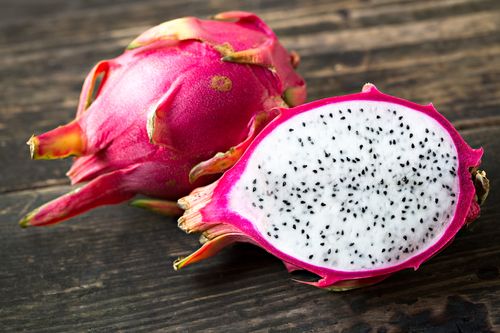
Dragon fruit, also known as ‘Pitaya’, is a pomegranate-size exotic fruit that looks quite animated with its large green-tipped scales and bright pink skin. Inside, it contains white-colored flesh that’s scattered with tiny black seeds. Dragon fruit is a great source of iron, fiber, and magnesium, and offer an array of antioxidants that protect the cells.
Dragon fruit is native to Central America but is now successfully grown and produced in Hawaii, Australia, New Zealand, Thailand, and Vietnam.
100 grams of Dragon fruit contains:
Dragon fruit can help reduce insulin resistance and fatty liver in obese people. The fruit contains high levels of prebiotic fiber that influences the growth of good gut bacteria. The antioxidants present in the fruit can help reduce the risk of high blood pressure, heart disease, and diabetes.
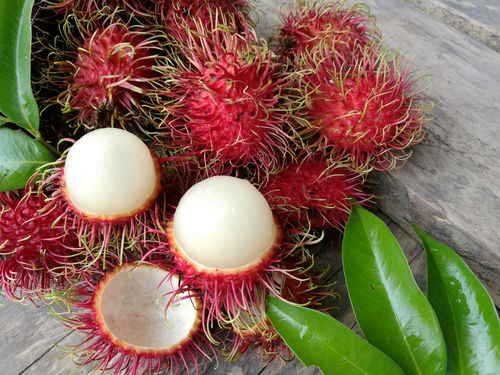
Rambutan’s appearance is often compared to that of sea urchins due to its hairy red, yellow, and green shell. The fruit is closely related to the lychee and has a similar appearance and taste.
Rambutans are native to Indonesia and Malaysia but are grown in high quantities in South Indian states of Kerala and Tamil Nadu.
100 grams of Rambutan contains:
Rambutan contains high Vitamin C content that helps create collagen for healthier hair, skin, and nails. Copper in rambutan aids with the production of red blood cells and helps maintain healthy nerves and blood vessels. Rambutan seeds and skin contains sufficient amounts of antioxidants that work as anti-aging agents and can also help treat chronic diseases.
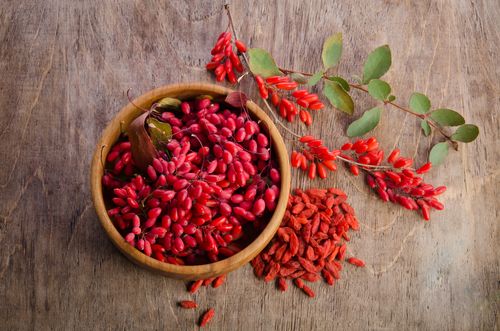
Goji berries are also known as ‘wolfberries’ that boast a festive red color and have a sweet and sour taste. These berries are often consumed in their dried state, like raisins, and thus are part of many delicacies. This exotic fruit has been part of traditional Chinese medicine for centuries.
Goji berries are native to China but can also be found all across Asia and in some European countries.
100 grams of Goji berries contains:
Vitamin D in Goji berries can help boost flu protection and immune system health. The high fiber content in Goji berries helps pack healthy energy into small servings that allows you to stay on track with your weight loss goals. Goji berries also have ties with fertility and sex drive. It can help increase sperm count, improve sexual ability, and increase testosterone.
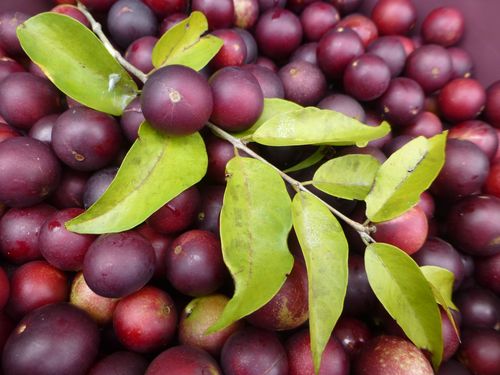
Camu Camu is a nutrient-rich fruit that looks similar to the cherry in color and shape. It has a sour taste and contains 2-3 large seeds. Most often, this exotic fruit is consumed raw but is added as a flavor enhancer in smoothies in its powder form and as a garnish in puddings and salads.
Camu Camu grows in South America’s Amazon rain forests and is native to countries like Venezuela, Colombia, Peru, and Brazil.
100 grams of Camu Camu contains:
As Camu Camu is a high source of Vitamin C, it helps in strengthening of immune system and formation of collagen that is necessary for healthy skin, muscles, and bones. This exotic fruit can be effective in lowering inflammation in the body as it contains powerful antioxidants. Animal studies have shown that camu camu may help reduce body weight by promoting calorie burn and improving gut health.
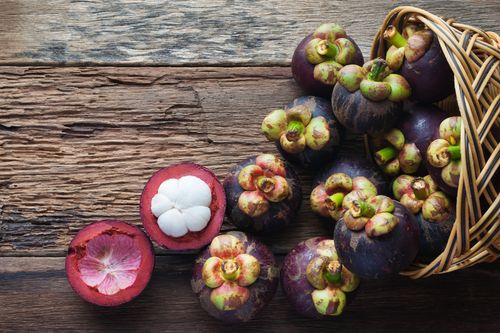
Mangosteen is known for its unique appearance and flavor and thus, this exotic fruit is often referred to as the ‘queen of tropical fruits.’ Mangosteen fruit boasts a round, purple-colored structure that is popular for its white, juicy, and delicious flesh. This fruit has been a crucial part of Asian medicine for thousands of years and is eaten raw.
Mangosteen is native to China and is also found in some Southeast Asian countries like Indonesia, Malaysia, Thailand, and Cambodia.
1 cup Mangosteen contains:
Mangosteen contains all the essential nutrients required for growth and development of the body and overall nutritional well being. This exotic fruit is a good source of vitamin C that acts as a powerful antioxidant that may have anticancer effects on the body. Mangosteen contains splendid amounts of minerals like magnesium, manganese, and copper, which are necessary for proper internal body functions.
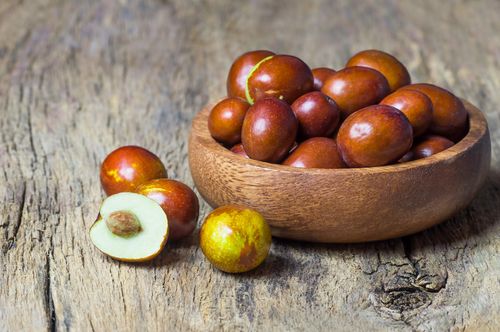
Jujube or Chinese date is a popular exotic fruit across the globe. Due to their chewy texture and sweet taste, Jujube is often dried and eaten. They are mostly used in desserts and candies and is enjoyed raw as well. Jujube fruit has a dark red texture and is widely consumed as a remedy for anxiety.
Jujube is produced in China and is exported all across the globe for its tangy and sweet taste and medicinal properties.
For a bowl (100 grams) raw Jujube, it contains:
Jujube fruit is rich in antioxidants, especially flavonoids that prevent and reverse the damage caused by free radicals. Jujube fruits are widely consumed due to their sleep aggravating properties. Moreover, the unique antioxidants also help in decreasing anxiety. The fruit contains high fiber content that helps improve digestion as it softens and adds bulk to your stool.
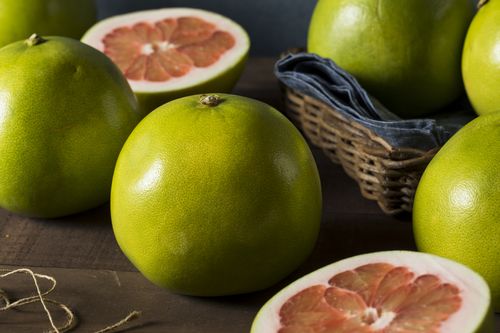
Pummelo fruit comes from the citrus fruit family and is probably the largest member. It is slightly on the sweeter side but somewhat tastes like a grapefruit. Pummelos are high in vitamin C, folate, and potassium, and thus, can provide certain health benefits.
Pummelo is native to Southeast Asia and is highly produced in China. This exotic fruit has been a part of traditional Asian medicine and is still used in certain home remedies.
One whole Pummelo fruit contains:
Since Pummelo is a citrus fruit, it has vitamin C in abundance that is essential for good bone structure. The fruit is also rich in fiber content that helps boost satiety and ultimately improves the digestive health. There are studies investigating the role of citric acid in the prevention of cancer, and Pummelo fruit may provide the benefit.

Kiwano, also known as African cucumber or horned melon, looks like an alien fruit, and from the inside, it is even more confusing. What makes Kiwano appealing is its taste. The taste is an odd combination of cucumber, zucchini, and kiwi fruit. Kiwano belongs to the melon family and is consumed globally.
Kiwano originates from the central and southern parts of Africa. But today, this exotic fruit can be found in temperate regions across the globe.
Kiwano has several potent antioxidants that can protect against cell damage caused by free radicals. The fruit not only reduces inflammation but also helps in preventing chronic diseases. This exotic fruit helps in the production of red blood cells since it contains iron in abundance. Most importantly, Kiwano fruit supports proper hydration as it contains 88% water.
Everything natural and organic has its health benefits and the same goes with these exotic fruits. These fruits are filled with nutritional benefits and can help you improve your health if accepted into the daily lifestyle. Just like other seasonal fruits, exotic fruits are loaded with essential nutrients – vitamins, minerals, and antioxidants which we need on a daily basis. Adding these exotic fruits to your diet can be beneficial to you in the long run.


Hey Alpa,
I read you full artical.Love this. Fruits are an excellent source of vitamins and minerals that are good and rich in fiber. It also has many health benefits, including flavonoids. Eating too much fruit and vegetables can reduce your risk of heart disease, cancer, diabetes and diabetes. Dragon Fruit,Rambutan,Goji Berries,Camu,Camu,Mangosteen,Jujube,Pummelo,Kiwano 9 fruits is always be the best for me.I take everytime 50gm or much more for my body to fit.But I want to know about imporveing cholesterol rate which fruit to be taken?
I love to eat fruits. Thank you so much for sharing these different types of healthy fruits
Here I have eaten almost all the fruits except jujube. After the pandemic, I will try it. Thank you for nice post.
I haven’t eaten durian and Kiwano now, I hope I’ll try very soon, let’s see what it feels like. Thanks for sharing this post. It’s really great article 🙂
Hi Rupali, We really appreciate you taking the time out to share your experience with us. Thank you so much for your kind words.
Wonderful article Navya! I’ve never heard of Kiwano before, I’ll definitely have to try that.
Hi Eric, Thank you so much for taking the time to leave us this amazing review.
All these, seem to be excellent choices but if i had to choose one, that would probably be kiwano, for it is low in calories and high in protein and zinc. I am in my mid-forties and in a relative shortage of zinc, which is a testosterone booster. Great article, thank you very much for sharing all these great fruit choices.
Hi Adam, We are so grateful for your kind words. Thanks for sharing your feedback with us. Keep following our blogs.